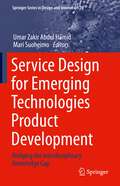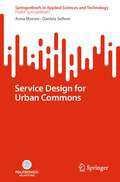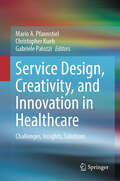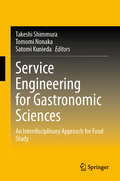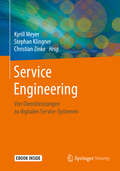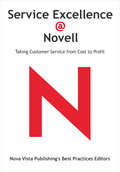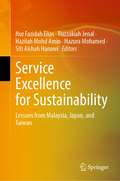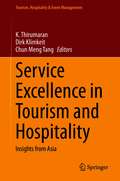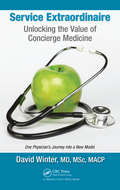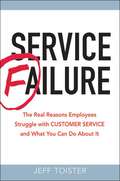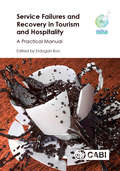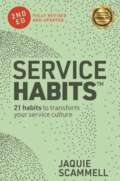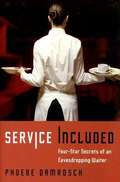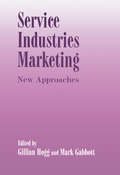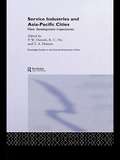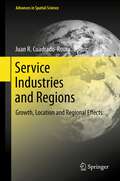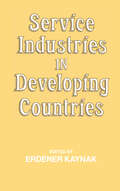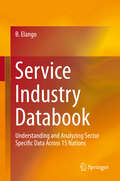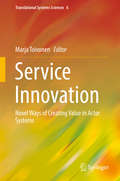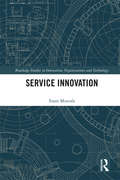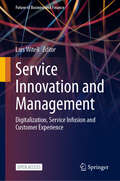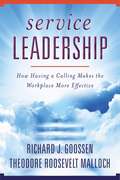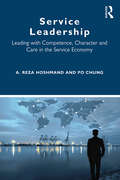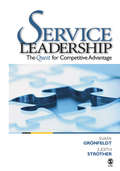- Table View
- List View
Service Design for Emerging Technologies Product Development: Bridging the Interdisciplinary Knowledge Gap (Springer Series in Design and Innovation #29)
by Umar Zakir Abdul Hamid Mari SuoheimoThe productization of emerging technologies related to the Fourth Industrial Revolution (FIR) is now getting more attention across different industries. Compared to the previous industrial transformations that the world has seen which relied on mechanical innovations, the ongoing FIR is seeing software and data-driven products as the foundation. Apart from that, topics such as circular and sustainable economy as well as climate change are also disrupting the industrial ecosystem. For a viable and successful productization of emerging technologies, collaborations between interdisciplinary stakeholders are a necessity. One of the elements that has been identified to facilitate this collaboration is service design. This book aimed to provide comprehensive service design discussions for practitioners in different fields and sectors. The aim is to bridge the knowledge gap between experts in academia, business and product development, among many others, to provide a unified understanding of the importance of service design for the productization of emerging technologies. The book consists of an overview of emerging technologies product development and service design, as well as perspectives from different sectors of the industry. The book is expected to benefit multi-disciplinary researchers, practitioners and general audiences with interests in Service Design for Emerging Technologies.
Service Design for Urban Commons (SpringerBriefs in Applied Sciences and Technology)
by Daniela Selloni Anna MeroniThis book explores the application of service design to urban commons. It originates from a project developed by the research group of POLIMI DESIS Lab of Politecnico di Milano, aimed at imagining the future of the Reggio Emilia Ducal Palace and its park - the Reggia di Rivalta. The peculiarity of the project lays in the idea that the design of a (public) space should be informed by the design of its services, because the development of specific activities actually builds a fundamental part of the identity of a place, conceiving both the tangible and intangible dimensions as part of a single creative process. The combination of a participatory process and the integration of spatial and service design led to infrastructuring a multi-stakeholder participatory action research of envisioning the future of a public good. This effort has been thus framed into a working methodology, specific tools and progressive outputs, which are defined as Service Master Planning (the process), and Service Master Plan (the product), allowing service design professionals to expand their knowledge and develop skills for a new field of application connected to urban planning.
Service Design, Creativity, and Innovation in Healthcare: Challenges, Insights, Solutions
by Mario A. Pfannstiel Christopher Kueh Gabriele PalozziIn this meticulously curated anthology, exploring the dynamic intersections of creativity, design, and innovation within the healthcare landscape, esteemed experts present novel service design solutions. Engaging with pressing challenges, exchanging insights, and unveiling pioneering approaches, contributors navigate the complexities of healthcare delivery with finesse and foresight. With a multidisciplinary lens, this collection serves as a nexus between theory and practice, offering profound reflections and actionable strategies aimed at elevating patient-centered care. Catering to healthcare professionals, scholars, and policymakers alike, this anthology is poised to catalyze substantive change in the healthcare milieu. Whether exploring the integration of state-of-the-art methodologies or reconceptualizing conventional healthcare paradigms, this collection underscores the paramount importance of creativity, design, and innovation in shaping the trajectory of healthcare delivery.
Service Engineering for Gastronomic Sciences: An Interdisciplinary Approach for Food Study
by Takeshi Shimmura Tomomi Nonaka Satomi KuniedaThis pioneering book on food study pursues an interdisciplinary approach to service science and the service engineering field. Further, it highlights a range of experiments conducted at actual business sites to verify the effectiveness of the proposed methodologies and theories. In modern society, food study has become more complex, as it involves multiple fields of science. For instance, a long-lived society entails a number of problems for human beings. A balanced intake of nutrients is important for a healthy life, but in many cases, healthy food is not the most enjoyable. As such, it is important for the food industry to provide foods that are both tasty and wholesome, based on the sciences of gastronomy and nutrition. Conventional food study proceeds along the lines of a specific field such as nutrition, agriculture, or gastronomy, though it should be conducted in an interdisciplinary manner. This book covers multifaceted research on food study to respond to today’s societal demands, based mainly on the natural and social sciences. It addresses a wide range of topics, including: food production management using mathematical modeling, operations research, and production engineering; evaluation of food products based on big data analysis; psychological experiments and ethnography; food products based on consumer behavior; organoleptic assessment and health improvement; design of physical dining environments using virtual reality, pedestrian debt recognition (human indoor position measuring), and observation of behavior. Reporting on and assessing many studies conducted at actual business locations, the book offers a unique and highly practical resource.
Service Engineering: Von Dienstleistungen Zu Digitalen Service-systemen
by Kyrill Meyer Stephan Klingner Christian ZinkeDas Buch beleuchtet aktuelle Herausforderungen des Service Engineerings und zeigt dessen Entwicklung im Kontext digitaler Service-Systeme sowie Chancen und Möglichkeiten, die digitale Dienstleistungsangebote und vernetzte Lösungen bieten. Wissenschaftliche Ausführungen werden durch praxisorientierte Beispiele, welche die Anwendung der Lösungsansätze und Methoden demonstrieren, ergänzt. Damit betrachten die Autoren dieses Sammelbands einerseits die Evolution der systematischen Dienstleistungsentwicklung in Theorie und Praxis und stellen andererseits aktuelle Forschungsthemen und Entwicklungstendenzen vor. Dazu ziehen die Herausgeber Arbeiten der Partner des Forschernetzwerkes FOKUS Service Engineering heran. Die Beiträge sprechen sowohl Wissenschaftler als auch Vertreter der Praxis an.
Service Excellence @ Novell: Nova Vista Publishing's Best Practices Editors
by Nova Vista Publishing's Best Practices Editors<p>Novell transformed customer service, attaining a level of excellence that turned a cost center into a significant profit center and created a key differentiator in the marketplace.</p>
Service Excellence for Sustainability: Lessons from Malaysia, Japan, and Taiwan
by Nur Fazidah Elias Ruzzakiah Jenal Hazilah Mohd Amin Hazura Mohamed Siti Aishah HanawiThis book provides significant conceptual and empirical contributions to the understanding of service science and the practices of service sectors in the wake of the fourth industrial revolution bringing together a collection of articles written by keynote and invited speakers at the 2nd Service Science Symposium held on 24 November 2019. The symposium was organised by the Serviceology Society Malaysia (SESMA), which aims to bring service researchers and practitioners under one roof to redefine service concepts and ideas and explore their application in real industrial and community settings. In their contributions, authors present multiple real-world cases of service systems to demonstrate how organisations can incorporate service science to achieve sustainable development. By re-examining the existing service science models and the value creation process using valuable insights obtained from industries and communities in Malaysia, Japan and Taiwan, the authors present a new way forward for organisations.
Service Excellence in Tourism and Hospitality: Insights from Asia (Tourism, Hospitality & Event Management)
by K. Thirumaran Dirk Klimkeit Chun Meng TangService operations management in the tourism and hospitality industry requires a high level of coordination, communication and facilitation to satisfy visitors. In all of these activities, service excellence means a lot to visitors in terms of their experience, and to the business it means repeat customers and word-of-mouth marketing. Based on fresh empirical evidence from the field, this book captures the different approaches and challenges to service excellence in the Asian tourism and hospitality industry. Focusing on hotels, attractions, transport providers and other segments in tourism and hospitality, this book presents new case studies underlining and detailing global and local travel industry practices. The book is meant as a reference and supplementary reading for students, researchers and industry practitioners.
Service Extraordinaire: Unlocking the Value of Concierge Medicine
by David WinterConcierge medicine represents a relatively novel health care delivery model that is becoming more appealing both to providers and patients because of its potential to improve quality and value in health care. A gap exists in the current literature regarding the benefits and challenges associated with concierge medicine as well as best practices for developing and sustaining a successful, patient-centered concierge practice. This book aims to close the gap by discussing the role of concierge medicine in the context of the evolving U.S. healthcare system and the changes produced by the Affordable Care Act. It will address questions about affordability, access, quality, value, communication, technology, and patient-centered care, and will include real-world best practice examples from a successful concierge medicine practice.
Service Failure: The Real Reasons Employees Struggle with Customer Service and What You Can Do About It
by Jeff ToisterCustomer service goals have been articulated, messages drilled, and incentive programs created. But many employees still deliver lackluster service. What does it take to get them functioning as stellar frontline representatives of the company? Rather than offering another set of tactics for improving customer service, this book takes a novel approach by rooting out the real reasons employees arent delivering the service they should. The results can be both surprising and illuminating, such as: Company culture doesnt always support service excellence Over-emphasis on cost reduction often increases the cost of service Employees are torn between doing the right thing for the customer and following policy Poor products and services can make helping the customer nearly impossible Employees interests often dont align with company goals Once core problems are identified, the book offers corrective solutions, including redirecting coaching efforts, revisiting policies and procedures, clarifying roles and responsibilities, and more. Filled with inside stories from well-known organizations and the latest scientific research, Service Failure helps people overcome the obstacles preventing them from doing their very best.
Service Failures and Recovery in Tourism and Hospitality: A Practical Manual
by Erdogan Koc Dallen Timothy Hakan Boz Aybeniz Akdeniz Ar Umut Avci Gulnil Aydin Melissa A. Baker Kemal Birdir Huey Chern Boo Ugur Caliskan Celil Cakici Ali Dalgic Christina K. Dimitriou Mariangela Franch Ozan Guler Jong-Hyeong Anna Irimiás Petranka Kelly Kawon Kim Jennifer Lawlor Minwoo Lee Poh Theng Loo Gábor Michalkó Michael Mulvey Isil Arikan Saltik Derya ToksözTourism and hospitality services are highly prone to service-failure due to a high level of customer-employee contact and the inseparable, intangible, heterogeneous and perishable nature of these services. Service Failures and Recovery in Tourism and Hospitality, with its extensive coverage of the literature, presents an invaluable source of information for academics, students, researchers and practitioners. In addition to its extensive coverage of the literature in terms of recent research published in top tier journals, chapters in the book contain student aids, real-life examples, case studies, links to websites and activities alongside discussion questions and presentation slides for in-class use by teaching staff. This book is enhanced with supplementary resources. The customizable lecture slides can be found at: www.cabi.org/openresources/90677
Service Failures and Recovery in Tourism and Hospitality: A Practical Manual
by Erdogan KocTourism and hospitality services are highly prone to service-failure due to a high level of customer-employee contact and the inseparable, intangible, heterogeneous and perishable nature of these services. Service Failures and Recovery in Tourism and Hospitality, with its extensive coverage of the literature, presents an invaluable source of information for academics, students, researchers and practitioners. In addition to its extensive coverage of the literature in terms of recent research published in top tier journals, chapters in the book contain student aids, real-life examples, case studies, links to websites and activities alongside discussion questions and presentation slides for in-class use by teaching staff. This book is enhanced with supplementary resources. The customizable lecture slides can be found at: www. cabi. org/openresources/90677
Service Habits: 21 Habits to Transform Your Service Culture
by Jaquie Scammell21 key habits service leaders can adopt to improve effectiveness and strengthen the relationships with the people they serve.Service leaders know how to deliver great results, but they are often so focused on systems and speed that they've forgotten service still is, and always will be, about building long-lasting relationships – with their teams and their customers.Based on practices that have been used to improve thousands of people's relationships at work and with their customers, these habits will enhance overall team performance and allow leaders to concentrate on achieving incredible results. Think Atomic Habits for customer service professionals.
Service Included: Four-Star Secrets of an Eavesdropping Waiter
by Phoebe DamroschKitchen Confidential meets Sex and the City in this delicious, behind-the-scenes memoir from the first female captain at one of New York City's most prestigious restaurants. While Phoebe Damrosch was figuring out what to do with her life, she supported herself by working as a waiter. Before long she was a captain at the New York City four-star restaurant Per Se, the culinary creation of master chef Thomas Keller. Service Included is the story of her experiences there: her obsession with food, her love affair with a sommelier, and her observations of the highly competitive and frenetic world of fine dining. She also provides the following dining tips: Please do not ask your waiter what else he or she does. Please do not steal your waiter's pen. Please do not say you're allergic when you don't like something. Please do not send something back after eating most of it. Please do not make faces or gagging noises when hearing the specials-someone else at the table might like to order one of them. After reading this book, diners will never sit down at a restaurant table the same way again.
Service Industries Marketing: New Approaches
by Mark Gabbott Gillian HoggThis book covers a wide spectrum of topics, service contexts and methodologies and reflects the broad range of current services research. Its aim is to provide an eclectic overview of services marketing by including papers that demonstrate the breadth and depth of research in this area, and it reflects the international scope and the strength of the discipline as we enter the new millennium.
Service Industries and Asia Pacific Cities: New Development Trajectories (Routledge Studies in the Growth Economies of Asia)
by K. C. Ho P. W. Daniels T. A. HuttonDuring the second half of the twentieth century, development in the Asia-Pacific region has been dominated by industrialization. However, at the beginning of the twenty-first century, services, in particular, finance, information and creative services, have become deeply embedded in the processes of urban growth. In Asia-Pacific the rise of service industries has lead to national modernization programmes and globalization strategies. Services are also driving change in the internal form of city regions and are being actively deployed as instruments of metropolitan reconfiguration and land use changes. These changes have created problems such as social polarization and the displacement of traditional industries and residential districts. Also, there are tensions between local and global processes in the development of service industries, and between the imperatives of competitive advantage and sustainable development.Service Industries and Asia Pacific Cities brings together a multi-disciplinary team of experts to explore and illustrate the theoretical, conceptual and practical issues arising from the transformation of Asia-Pacific cities by service industries.
Service Industries and Regions
by Juan R. Cuadrado-RouraThe service sector in most advanced economies accounts for up to seventy percent of employment and GDP and, given its growing importance, has received much research attention over the last two decades. However, not very much attention has been paid to the relationship between this sector and both its territorial impact and regional effects. The main objective of this book is to offer a comprehensive approach to these aspects, focusing particularly on the location factors of service industries and the importance of some specific services, such as business services and knowledge and information services. The contributions have been prepared by well-known experts in the field from a wide number of countries. The focus of all contributions is not only on theoretical aspects, but also provides empirical analyses on specific countries and topics such as the geographical concentration, globalization impacts, foreign direct investments, and innovation.
Service Industries in Developing Countries
by Erdener KaynakFirst Published in 2004. Routledge is an imprint of Taylor & Francis, an informa company.
Service Industry Databook
by B. ElangoLocating empirical information on specific service industry characteristics is not an easy task, even for an individual familiar with various sources of data. This book is a quick source of information on service industry statistics across many nations of the world. The reader is introduced to finding key sources of data, building analytical ratios from diverse sources, and understanding the advantages and disadvantages of data selection methods in the service sector. The global nature of the data compiled in this book, especially an extensive coverage of the United States, makes it an invaluable resource to active researchers and stakeholders in the service industry as well as those who seek to enter it.
Service Innovation
by Marja ToivonenThis is the first book that summarizes the 20-year history of service innovation research and combines it with the future need to adopt a systems view in the field of service research. The book emphasizes that the most urgent issues of today's economies - the development of welfare and sustainability - cannot be solved with innovations in individual service offerings only, and that innovations of service systems are increasingly needed. Various theoretical approaches and perspectives from different disciplines are included, providing a comprehensive view of the current understanding of the nature of service innovation. The book illustrates the achievements of two research traditions, one based on the general innovation theory and the other based on the service marketing theory. Service innovation is considered from the points of view of drivers, processes, practices, and outcomes. The interrelations between actors and systems are analyzed, and the nature of innovation as a new way to co-create value is highlighted. The book promotes the view that users are an important source of innovative ideas and that openness is an important success factor in innovation processes. In addition to the general nature and management of service innovation, some specific topics are included, exemplified by innovations in public services and in knowledge-intensive business services. This volume is highly recommended to readers who seek a state-of-the-art overview of the area of service innovation and its linkages to systems research.
Service Innovation (Routledge Studies in Innovation, Organizations and Technology)
by Esam MustafaThis book looks at service innovation, service industries, and innovation performance in services. It seeks a broader explanation and understanding of services, service innovation and its performance, and the future of service innovation in different service industries. In addition, it discusses service domination in the big economies around the world and how that was created and supported by service innovation. The book will be useful for academics interested in service innovation as well as practitioners in the service business.
Service Innovation and Management: Digitalization, Service Infusion and Customer Experience (Future of Business and Finance)
by Lars WitellThis open access book investigates how digitalization and service infusion are changing service provision and the customer experience. It highlights the central role of service management and service innovation in making these changes not only appear in theory but also implementing them in business practice. At the beginning of the 21st century, many manufacturing firms struggled to exploit the financial potential of service businesses, a phenomenon described as the service paradox. While many manufacturing firms are still struggling with this paradox, several firms (both service and manufacturing firms) are simultaneously struggling with digitalization. This phenomenon can be viewed as the digitalization paradox, i.e., as a situation in which companies invest in digitalization but struggle to reach the expected revenue growth. By applying the lens of service innovation to digitalization and service infusion, the book showcases how firms can overcome the service and digitalization paradoxes, transform service provision, and improve the customer experience. It offers comprehensive coverage, blending literature reviews, conceptualizations, empirical illustrations, and case studies to offer a multifaceted perspective on corporate strategies, illuminating pathways to address the challenges posed by the service and digitalization paradoxes. Built on the latest research from the CTF – Service Research Center at Karlstad University, Sweden, this book offers a valuable resource for managers seeking practical strategies and approaches to enhance their understanding and implementation of service management and marketing principles. It will also appeal to academics with an interest in service management and marketing.
Service Leadership: How Having a Calling Makes the Workplace More Effective
by Theodore Malloch Richard J. GoossenWhat will motivate an organization’s employees to be fully engaged in the corporate purpose? How can a company be more supportive of each individual’s pursuit of workplace meaning? Service Leadership answers these questions and more. “Service leadership” is the recognition and cultivation of the varied interests and beliefs of employees on their quest for purpose at work. An organization will not get the most out of its staff unless it respects each individual’s framework for the pursuit of meaning, which is often done in the context of spirituality and religion. Service leadership takes many forms and is not the same for everyone. People can and want to learn how to become service leaders. Service Leadership shows how these ideas can be implemented through a detailed framework. Extensive research confirms that organizations that do not address the existing core belief systems of employees will be disadvantaged in the marketplace. Interviews with top executives at organizations like Whole Foods, Facebook, Gloria Jean’s Coffee, and Costco shed light on how both companies and employees can utilize service leadership to find and keep meaning in the workplace, improving both job happiness and performance.
Service Leadership: Leading with Competence, Character and Care in the Service Economy
by Po Chung A. Reza HoshmandService Leadership offers students, researchers, and leaders a leadership model originating in the service economy – but which is gaining ground in all sectors and industries – explained by experts that were key actors in that origination at DHL International. Designed for undergraduates and graduates but also useful for professionals in leadership positions, Hoshmand and Chung structure the book around the 3Cs of leadership in the service economy: Competence, Character, and Care. It shows how the integration of the 3Cs when applied in combination with each other creates an environment of trust within and outside the organization. Most importantly, it allows the reader to understand how a move from the manufacturing mindset (hierarchical decision making) to a service mindset (collective, qualitative, culturally sensitive) creates an ethical habitat and ecosystem that contributes to a firm’s competitiveness and adds value to its brand image. Incorporating elements of leadership literature, philosophy, psychology, sociology, economics, and political science, including cases, and supported by a teaching manual and a full set of slides, this book is ideal core reading for students of service leadership and leadership in the service economy, and valuable to those learning about leadership more broadly.
Service Leadership: The Quest for Competitive Advantage
by Svafa Gronfeldt Judith Banks StrotherThe purpose of this book is to provide a comprehensive theoretical framework as well as practical strategies—not just for survival but for a true search for excellence in the uncertain and ever-changing world of customer service management. The theoretical framework is based on the notion that customer service contains three key variables: a promise, a process, and people. After going through the step-by-step process of service management, the reader will have the necessary understanding and skill to choose the right strategy for the right circumstances, to design service processes, to identify the means and methods to implement these processes, and to measure the outcome.
